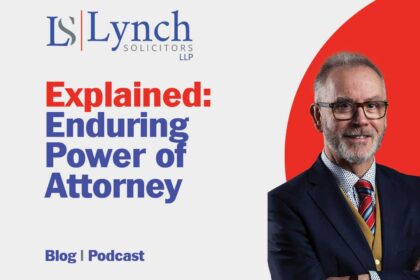
We have often spoken about wills and their importance to lay out your wishes. You can read more of our coverage of Wills by clicking here. An Enduring Power of Attorney (called EPA) is a complement to any Will.
An EPA will outline what happens should you become incapacitated and are no longer able to voice your wishes.
What is an Enduring Power of Attorney?
If someone becomes mentally incapacitated (for example, because of illness, disability, or a progressive degenerative illness), all of their assets and property are normally frozen.
An Enduring Power of Attorney prevents this from happening – it is often called ‘a Living Will’.
It can be an extremely powerful document. It significantly bypasses the hurdles and problems your family could face when trying to deal with your affairs should you become incapacitated.
It is a legally binding document that avoids the need to make someone a Ward of Court.
It appoints a named individual or individuals (usually a close family member) to look after both your personal and financial affairs.
It will not come into effect unless or until you lose your ability to manage your affairs.
Podcast: Enduring Power of Attorney
What Powers Does An Attorney Have
When you are considering your EPA, and after you have decided on your Attorney, you must also consider the scope of the power you are going to give your Attorney.
There are three variations on the power you can grant to your Attorney:
- Your financial and property affairs or
- Your health and personal affairs or
- All of your affairs (financial, property, health & personal affairs).
You may give your Attorney as much or a little power as you choose, for example:
- What to do with your house or investment properties
- Where you will live
- Who you will live with
- Your diet and dress
- Other very personal decisions which directly affect you and your future care.
You can nominate another person you would like the Attorney to consult with, so that the Attorney can take that person’s views int account.
Financial & Property Affairs
A general power grants your Attorney free rein to deal with your assets in whichever way they choose, subject to the actions being in your “best interests”.
You should also remember that, at present, once registered, your Attorney will have little or no supervision.
How Many Attorneys Can I Have?
You may choose one Attorney or more than one.
If you choose more than one, you can specify how they make decisions:
- Jointly – that is, they must all act together and cannot act separately, or
- Jointly and severally – they can all act together but they can also act separately if they wish.
Can An Attorney’s Registration Be Refused?
An application may be refused if:
- The Power created by the document is no longer valid
- The Donor (you) is not mentally incapacitated or not capable of becoming mentally incapacitated
- The Attorney is not a suitable person to fulfill the role
- Fraud or undue influence was used to induce the Donor (you) to create the power
Is There Any Restriction on Who I Can Appoint?
An Enduring Power of Attorney may be granted to individuals or trust corporations but may not be granted to:
- People under the age of 18
- Bankrupts
- People convicted of offences involving fraud or dishonesty
- People disqualified under the Companies Acts
- An individual or trust corporation who owns a nursing home in which you live or an employee or agent of the owner, unless that person is also your spouse, civil partner, child or sibling.
There are many reasons that might justify you making an Enduring Power of Attorney.
You may have a history of mental illness, Alzheimers, or pre-senile dementia in the family. You may be involved in an accident or you may have an illness that will leave you unable to look after yourself.
However, the most obvious reason is that we do not know what lies ahead and if you don’t have an EPA you will have no one to carry out your wishes in accordance with your wishes.
Contact Us
If you would like more information, you can contact a member of our team on 052 612 4344 or at info@lynchsolicitors.ie
The material contained in this article is provided for general information purposes only. We advise you to seek specific advice from us about any legal decision or course of action.

